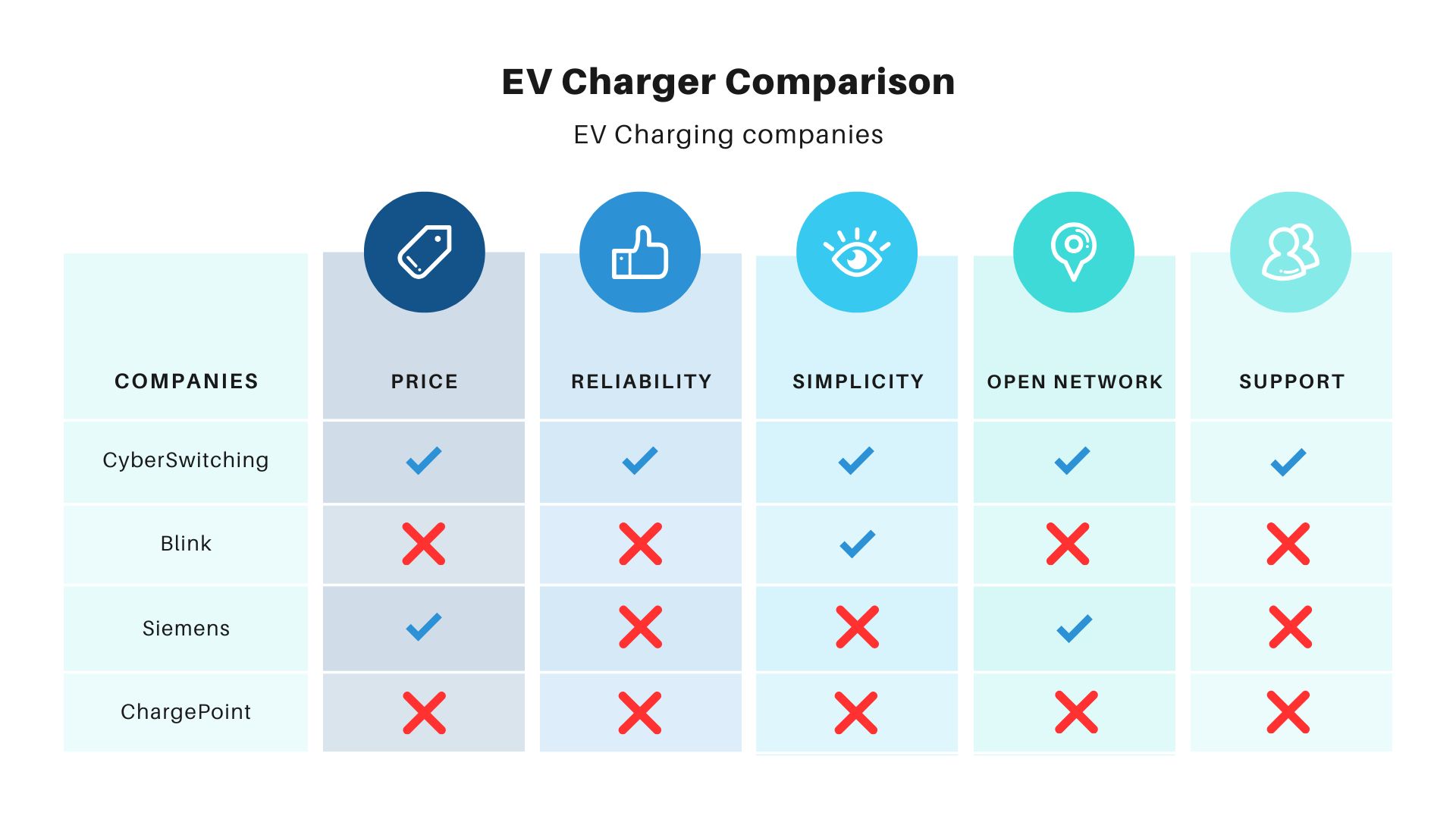Home / Commercial EV Charging Station / EV Charging Station for Schools
EV Charging station companies comparison

$1,190.00 – $1,320.00Price range: $1,190.00 through $1,320.00
$2,890.00 Original price was: $2,890.00.$2,790.00Current price is: $2,790.00.
$3,950.00 Original price was: $3,950.00.$3,050.00Current price is: $3,050.00.
As technology advances, schools strive to stay at the forefront, and the growing popularity of electric vehicles (EVs) makes installing EV charging stations a necessity. With more than 1.9 million EVs on American roads, and more to come, the installation of EV charging stations for schools will become a need in the future. EV charging stations not only enhance the property’s value but also demonstrate the school’s commitment to sustainability, attracting environmentally conscious students, parents, and educators.
Level 2 EV chargers are the most widely used technology for schools due to their balance of speed and affordability. These chargers can provide 20 to 30 miles of range in just an hour, making them convenient for regular commutes. Many universities are starting to support e-mobility by installing EV charging station in a school. An important mention goes to Harvard University with its more than 50 EV charging stalls distributed across the campus. Other universities featuring from 20 to almost 40 EV charging stations include the University of California at Davis, Townson University in Maryland, Santa Clarita University in California, and more.
Cyber Switching’s CSE1 EV Charger stands out as an ideal solution for schools due to its combination of advanced features, ease of use, and scalability. Its sleek design seamlessly integrates into school environments, while its robust construction ensures durability and long-lasting performance. The CSE1’s advanced monitoring capabilities provide real-time insights into charging activities, allowing schools to manage energy consumption efficiently and optimize charging schedules.
An EV high school charger can become a potential source of income for the educational institution while providing a valuable service to the school members. The CSE1 will allow you to set pricing for charging an electric vehicle and thus generate revenues from EV charging. Students and teachers with EVs can spend more than 8h a day at school, which is more than enough to charge an electric vehicle with the CSE1.
Access to the electric car charging station can also be limited to only members of the community thanks to the Cyber Switching RFID-ready EV charger, which enables user authentication and blocks any users outside of the institution from charging their vehicle. This will ensure the community will have the charger ready for charging without having to wait for electric vehicles that do not belong to the university or school.
High school, college, and university students are often under immense pressure due to exams and events. By installing a Cyber Switching CSE1 EV charging station, you will give your electric vehicle owner student community one less thing to worry about, as they will be able to conveniently charge their electric vehicles at their educational institution, thereby substantially reducing their anxiety range.
UC Davis
California

Princeton
University

Carnegie
Mellon

MC Morton
College

Mendocino
College

When selecting an EV charging station for schools, several key considerations should be taken into account to ensure a successful implementation:
By carefully considering these factors, educational institutions can choose EV charging solutions that meet the specific needs of their campus community while contributing to sustainability efforts and providing valuable amenities for electric vehicle owners.
The RFID user authentication is probably one of the best ways to enable control access to the charger. The best thing is that it is simple to use. Simply by using an RFID card from the educational institution the user will be able to activate the EV charging station and have access to the system to start the charging process.
The CSE1 EV charger has been designed to work with multiple payment platforms including Google Pay, Amazon Pay, and credit or debit cards. EV driver will attach his payment method and will get charged for the charging based on the site host’s rate.
A driver will get a notification via mobile app about it. Also, The CSE1 EV charging station has a multi-colored LED charging status indicator which gives a reference of the charging status for the EVSE. When the vehicle is connected, a flashing green light will be seen, after the car has been completely charged, the green light will be constant.
Yes, there are multiple state level incentives available. CyberSwitching CSE1 EV charging stations got approved by over 75 rebate programs nationwide.
Yes, both the CSE1 and CSE2 charging station are ETL-listed equipment with a Type 3 enclosure that is rated to work indoors or outdoors. This means they’re rated to prevent dirt and dust from entering inside the equipment and is also protected against rain, snow, or sleet.
Both CSE1 and CSE2 EV charging stations could be mounted on the wall, on a standard pedestal as well as on the pedestals with cable management
CNET

TechCrunch

Nasdaq

TechTimes

IBT

Yahoo

Torque

Hackernoon

Email: info@cyberswitching.com
Phone: 1.408.436.9830
Having trouble? Find the answer to your query here. Don’t hesitate to contact us!
Follow our latest news and thoughts which focuses exclusively on Power Management and EV Charging